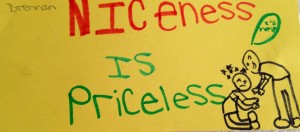 Helping your child be “bully – proof” goes in two directions. Of course we do not want our child to be the target of bullying nor do we want them to be the one who is aggressive toward others. Our own habits as parents have an impact on our children as to whether they will become aggressive or if they will shrink back and become a target. Consider the following;
Helping your child be “bully – proof” goes in two directions. Of course we do not want our child to be the target of bullying nor do we want them to be the one who is aggressive toward others. Our own habits as parents have an impact on our children as to whether they will become aggressive or if they will shrink back and become a target. Consider the following;
Imagine seeing one child chiding another with saying, “na-na-na-na-”, teasing or just being mean. I can imagine that they learned to do that from other children, or even their parents teasing them – pushing them beyond good natured teasing into a taunt. Being aware of how far we go as a parent or seeing this happen and not letting it go is a good start – asking ourselves or them to focus on how such actions might feel to the child on the receiving end of such teasing. Now they may become obstinate about how the child might feel, but our job is to help them to learn that this does not feel good when it continues for too long of a time.
Just as important as it is to stop negative behavior, it is even more important to encourage positive behavior. Teaching them to be kind, to show empathy and be fair are all critical skills for good relationships with others. Teaching empathy may begin by observing others and asking them how do they think the person feels. They will learn to read the emotions of others by the facial expressions, body language, tone of voice and other signs. Using real people and television characters are all ways of teaching without it being about them – or personal to them. You may always refer back to the third party person later when you are talking about a behavior you would like to change in them.
On the other side of the issue is teaching our children to be assertive – learning to use their voice – saying “no” firmly. I call it using their “bad dog” voice when asking someone to stop doing something that is hurtful, physically or verbally. Role playing and letting them practice using their voice is key to their ability to do so. It does not come natural and many children have grown so used to being asked to be quiet – that when asked to be assertive it is very hard for them to do so.
Creating these habits in children should begin at an early age – kindergarten at the least, if they are to avoid being the victim of or become the aggressor. Giving them these skills, will grow their confidence and feeling good about themselves as they face different situations as they are growing older.






